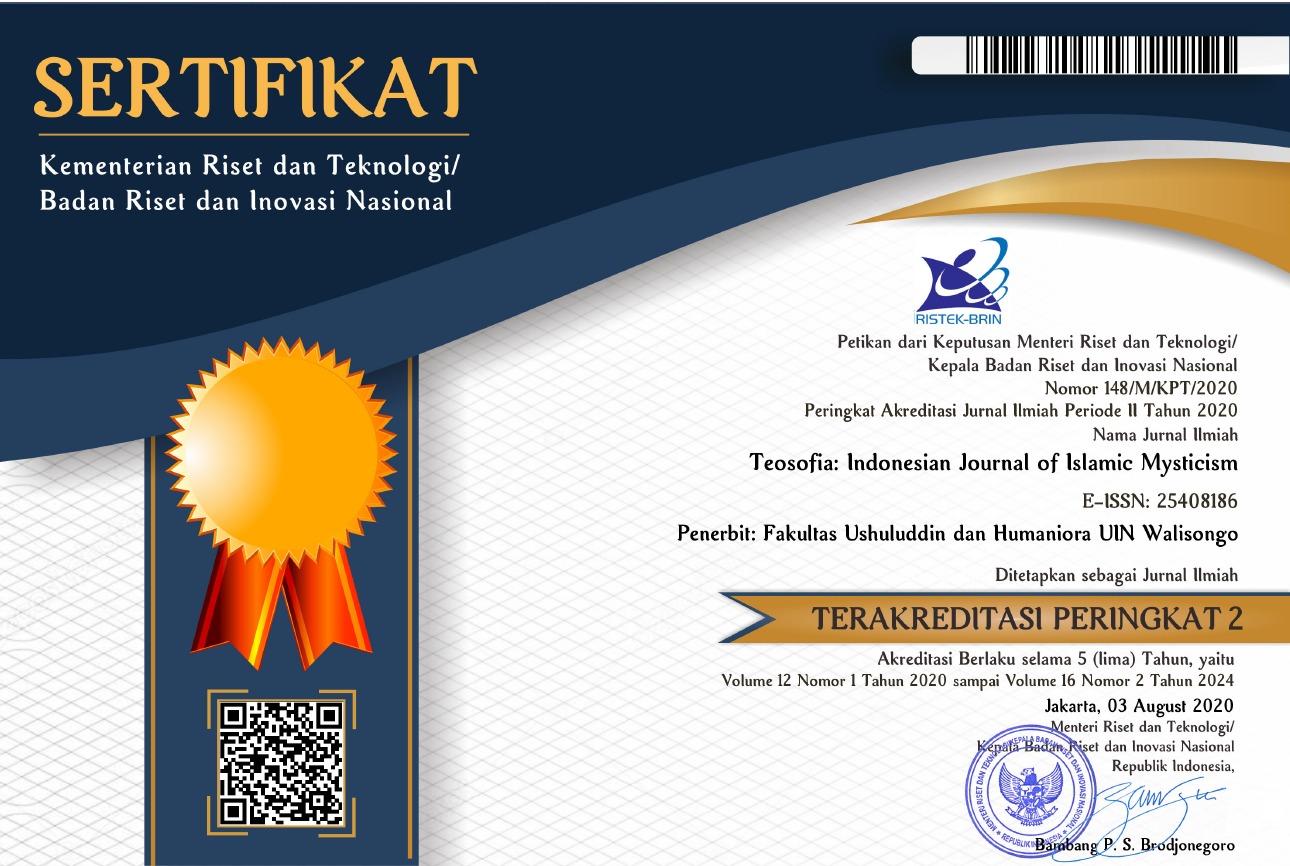SYATAHAT OF THE SUFIS AND THE ISSUE OF HUMAN CONSCIOUSNESS
DOI:
https://doi.org/10.21580/tos.v1i1.4786Keywords:
syat}ah}a>t, extasy, psychology, SufisAbstract
ABSTRACT
This research empasizes on digging the consept of Syat{ah{a<t of Sufis where several tasawuf companion showed their psychological condition up on paradoct position, switces themselves on God position. Then, trought researching on Syat{ah{a<t of Sufis in psychological approach, researcher found several conclusions; i.e. (a) etimologically, Syat}ah}a>t means shaking (al-h}arakah); (b) terminologigally, Syat{ah{a<t of Sufis means any speeches that stranged to be heard by its audience when Sufis reached wajd or wuju>d level. The factors that force the Sufis said Syat{ah{a<t were: (1) the strong emotional feelings and rumbled spiritual extasy (wajd), (2) experiences self unification (ittih}a>d), (3) Sufis are in extacy condition (sakr), (4) Sufis hear the signal of divinity within them who invites self-union, so they positioned himself as God, and (5) they loss of self-consciousness; Additionally, the researchers added the other factors, i.e. (1) the Sufis movement comes from tawa>jud (salat, dhikr, meditation, contemplation, thought) on to the wajd or ecstasy level, (2) when Sufis heart is suddenly controlled by Allah Almighty (wa>rid al-il>ahiyyah), so he was no longer able to control their consciousness, and (3) absence of prejudice that the Sufis are united with God, because when that feeling comes, then they really had split (infisa>l). In other hand, Syat{ah{a<t of Sufis in psychological perspective, this study focused on transpersonal psychology, researchers tried to draw the conclusion that remarks Syat{ah{a<t in grammatical word used is a combination of words which are not common to say by common, because the context is only for Allah. Those unusual utterances are manifestation of Sufis psychology themselves, when saying syat}ah}a>t , Sufis do not realize whatever they have been said.
Downloads
References
Baharuddin, Paradigma Psikologi Islami; Studi Tentang Elemen Psikologi Dari Al- Qur’an, Jogjakarta: Pustaka Pelajar, 2004.
Ernst, Carl W, Ekspresi Ekstase dalam Sufisme, Yogyakarta: Putra Langit, 2003
Al-Hujwiri, Ali ibn Usman, Kashf al-Mahjoob, translated by. JA. Nicolson, Lahore: Zia-ul-Quran Publication, 2001.
Abbas, Qasim Muh}ammad, Al-H{allaj: I’ma>l al-Ka>milah, Beirut: Riad al-Rayyes Books, 2002
______, Abu Yazi>d al-Bustami>: al-Majmu>’ah al-S{u>fiyyah al-Ka>milah, Damascus: Al-Mada, 2004.
Al-Badawi>, Abdurrahman, Syat}ah}a>t al-S{u>fiyyah, Kuwait: Walakah al-Mat}bu>’ah, 1960.
Al-Baghdadi>, Ali ibn Anjab, Akhbar al-H{allaj min Andari al-Us}u>l al-Makhtu>ta>t fi> Si>rati al-H{allaj, Damascus: Da>r al-Thali’ah al-Jadi>dah, 1997.
Al-Ghaza>li>, Ihya’ Ulu>m al-Di>n, Kairo: Dar Ihya’ al-Kutub al-Arabiyah, tt.
Al-Randi>, Ibn ‘Ibad Al-Nafazi>, Syarh} al-H{ikam, Kairo: Dar Ihya’ al-Kutub al-‘Arabiyah, tt.
Al-Sulami>, Abu Abdirrahman, al-T{abaqa>t al-S{u>fiyyah, Beirut: Da>r al-Kutub al-Hadisah, 2003.
Al-Tu>si>, Sarraj, Al-Lumma’ fi al-Tas}awwuf, Mesir: Dar al-Kutub al-Hadisah, 1960.
Downloads
Published
How to Cite
Issue
Section
License
Copyright
The copyright of the received article shall be assigned to the journal as the publisher of the journal. The intended copyright includes the right to publish the article in various forms (including reprints). The journal maintains the publishing rights to the published articles. Therefore, the author must submit a statement of the Copyright Transfer Agreement.*)
Licensing

This work is licensed under a Creative Commons Attribution-ShareAlike 4.0 International License.
In line with the license, authors are allowed to share and adapt the material. In addition, the material must be given appropriate credit, provided with a link to the license, and indicated if changes were made. If authors remix, transform or build upon the material, authors must distribute their contributions under the same license as the original.
_______
*) Authors whose articles are accepted for publication will receive confirmation via email and send a Copyright Transfer Agreement.









